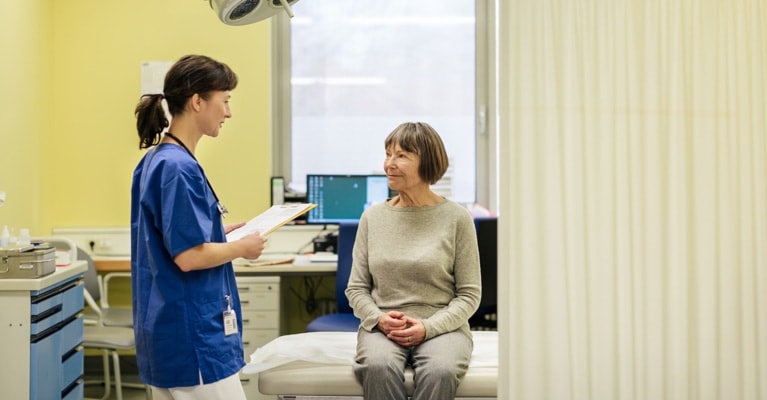
Dr. Adrienne Boissy on Showing Empathy
Dr. Adrienne Boissy is the chief experience officer of Cleveland Clinic, one of the largest and most respected hospitals in the country. She is tasked not only with tending to the physical and cognitive effects of multiple sclerosis on her patients but also with helping all patients navigate the emotional ravages of their illnesses. Here, she shares what she has learned throughout her career working with people in some of their most vulnerable moments.
How to cope
Q: When we’re suffering, how can we ask for help?
People can’t help if they don’t realize you’re suffering. They sometimes move on too quickly or think you’re fine. When you pick up the phone to tell someone that you’re in a dark place, you take a step toward feeling better. You don’t have to suffer alone.
Q: How does community help us cope with the emotional challenges of a degenerative illness?
In the spaces where medicine and doctors cannot go, community can. It looks different for everyone. Often patients are seeking a group of people living through the exact same thing. Same age. Same gender. They don’t just want a group of MS patients; they want a group of moms who are newly diagnosed MS patients. This is rooted in our desire for understanding—to be seen. The deepest form of empathy often comes from people who have been there themselves.
Look for people who are going through a similar experience. An in-person support group may work for you. Also consider online communities such as PatientsLikeMe, a website where people with chronic health conditions can connect with others facing the same issues. Relationships like these—in any form—can be very therapeutic.
Q: Are there common characteristics of patients who are more resilient than others?
Many of the patients whom I’ve seen rebound identified something to emerge for. They go through two major shifts. The first is when they accept their diagnosis or disease. The second is when they start asking themselves, “Now what?” The answer is different for different people. It can be centered on a loved one, an important moment like the birth of a child, or a personal interest. I had a patient who lost the use of her legs and then her arms. She still wanted to paint, so she painted with her mouth. You have to find that something in your life that brings you joy.
How to help others
Q: How can we be there for someone who has just learned they have a serious illness?
Start by acknowledging what your loved one is going through and be there for them as they process it. Too often, we don’t take time to recognize the gravity of impact, the bomb that just went off in somebody’s life. Then accept their reaction, whatever it is. They may cry, sit in silence, or even become angry. You’re helping by asking and creating the space for them to share.
Q: What’s the most important way to show empathy when our loved ones are suffering?
It means a lot when you validate a person’s pain. I’ve met with patients who believed they had multiple sclerosis, and I had to tell them that they didn't. They would often become angry or upset, and I couldn’t understand why. I eventually learned that even though the label of MS was not accurate, they still found comfort in having their suffering validated. I call it a “therapeutic mislabel.” By removing the label, I was removing their validation.
Empathy requires you to imagine what another person feels and then respond in kind to that person’s emotion. Your response may be a long hug, a phone call, or a reassurance that you support them. Whatever it is, the most important thing is that it’s authentic.
Q: What does Option B mean to you?
We have an annual Empathy + Innovation Summit at Cleveland Clinic. In 2016, one of our speakers was a mom, wife, and physician’s assistant. Two years after having a daughter with special needs, she found out she had metastatic breast cancer. At the end of her presentation, she read a poem called “Welcome to Holland.”
It was about getting on a plane. You’re so excited. You’re going to Italy! It’s going to be amazing! You bought all the guide books. You packed your bags. Then the plane lands in Holland. It’s not what you expected or prepared for, but your only option is to go buy a new guide book. To me, this is Option B.


